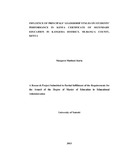| dc.description.abstract | The purpose of this study was to investigate the influence of principal leadership
styles on student performance in Certificate of Secondary Education
Examinations in Kangema District, Kenya. This study was guided by four
research questions. The study sought to establish the extent to which principals’
leadership styles (transformational, transactional and Laissez-Faire) respectively
influences performance in Kenya Certificate of Secondary Education
Examinations. It also sought to establish whether age, gender,
academic/professional qualification and administrative experiences influence
principals’ leadership styles. The path goal theory was used to guide this study as
the theory emphasizes on how leaders can facilitate task performance by showing
how performance is instrumental in achieving desired outcomes. The study used
exposed facto design. The dependent variable was student Certificate of
Secondary Education Examinations performance while independent variables
were principals’ leadership styles. The 26 public secondary schools with 26
principals and 272 teachers formed the study target population. A sample of 13
principals, 91 teachers was selected using stratified random sampling techniques.
Principals’ and teachers’ were used to collect data using questionnaires. The
questionnaires contained 18 statements on leadership behaviour of principal that
were into two sets.
Data was analyzed using descriptive statistics, pie charts, bar charts, tables and
percentages were calculated. Study findings revealed that transformational was
most practiced with student performance of 6.0 mean standard score, followed by
transactional leadership style with mean standard score of 5.5 and then laisserfaire
leadership style which was least practiced with a mean standard score of 3.6.
Based on the findings the study concluded that principal transformational
leadership styles had positive influence on student performance in Certificate of
Secondary Education Examinations. Finally, principals’ age administrative
experience has positive influence on students’ performance while gender and
academic /professional qualification has no influence on student performance.
The study recommended the following: Transformational and transactional
leadership styles should be used interchangeably to suit issues on performance,
Kenya Management Institute (KEMI) should support principals by providing
frequent and vigorous training in management programmes aimed at increasing
efficiency and effectiveness in school management. And organize seminars and
workshops for head teachers aimed at making them understand leadership skills
better since leadership skills are prerequisite for better academic performance,
Teacher Service Commission (T.S.C.) should appoint head teachers on the basis
of their academic/professional qualification. After the appointment of a head
teacher, T.S.C should continue monitoring the performance of the head teacher by
checking the progress of pupils’ performance in K.C.S.E and giving feedback to
the principals. | en |

